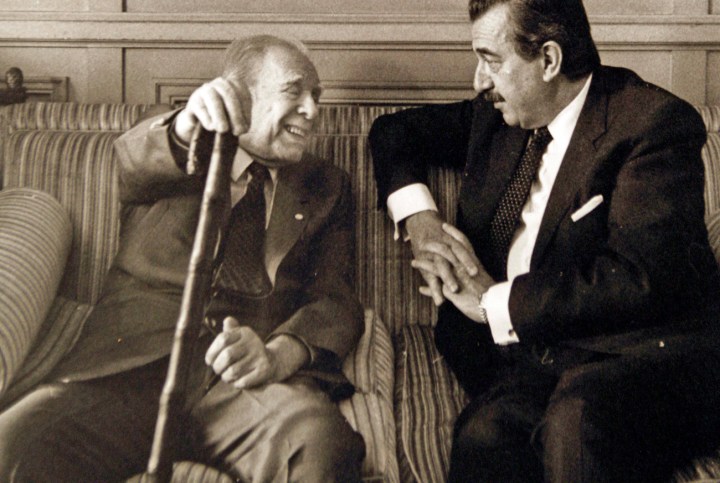Jorge Luis Borges: Google’s shrewdest doodle yet

Did you know that in the last thirteen years Google has commissioned 300 doodles for its US search page and a further 700 for its international assets? Did you care? Neither did we, until we saw the remarkable doodle commemorating Jorge Luis Borges’s 112th birthday (24 August, 2011), which kind of got us thinking. By KEVIN BLOOM.
Since Larry Page and Sergey Brin introduced the tradition in 1998, when they placed a stick-figure drawing behind the second “o” to indicate they were at the Burning Man festival, the doodle has become a hallmark of the world’s most successful search engine. In the early years the principle that drove the Google doodle was the celebration of fairly obvious holidays, like Bastille Day or Christmas, but with their takeover of the planet the company got the confidence to expand – the Winter Games, the Mars Rover landing, the 50th anniversary of the discovery of DNA; almost any event of world historical significance was seen as a wonderful opportunity for the California-based behemoth to further embed itself in the mass consciousness of a newly-wired humanity. Of course, Google itself was never about to cast the history of the doodle in quite these terms. The official view is heavy on benign phrasing and upbeat punctuation, as in the claim that “doodles on the Google homepage have made searching on Google more fun and enjoyable for its users worldwide,” and the assertion that, nowadays, “many users excitedly anticipate the release of each new doodle and some even collect them!”
Yay! But whatever Google may have done to let us know that its intentions aren’t always as pure as it makes out – for instance, a privacy policy that allows individual search histories to be used for targeted advertising – the fact of the matter is that some of the doodles have been impressively thought-provoking. On 2 August this year, Internet users in Kenya awoke to find that their favourite search engine had designed a tasteful panorama of horns and heads, a celebration of the annual Wildebeest migration; on 9 June, users worldwide were confronted with logo letters made up of guitar strings and frets, to commemorate the 96th birthday of Les Paul.
Today, however, 24 August 2011, may mark one of Google’s best doodles yet. A magical realist montage shows an aging man with a walking stick; his back is turned to the audience, and he is looking out over a vista of labyrinths, arches, domes, staircases, and forking paths. The different architectural styles represent an array of regions and languages, and the room the man is standing in contains a vast library. If you click on the doodle (a poor word for this exquisitely detailed illustration), you will be taken to the first page of search results for the Argentine author Jorge Luis Borges. Wednesday would have been Borges’s 112th birthday.
An odd anniversary to observe, perhaps, but a shrewd move nonetheless. Already favourably appraised by international artists, the illustration reflects the enduring literary concerns of the blind author – the common themes in Borges’s stories involve dreams, labyrinths, libraries and fictional writers. He was also (and this is where Google’s shrewdness comes in) a champion of “hypertext” in literature; his most esteemed works, the short story collections Ficciones (1944) and The Aleph (1949), interweave all of the above elements, while commenting subtly on mysticism and God. Prefiguring the digital age, Borges envisioned “a massive branching structure as a better way to organise data and to represent human experience”. In a similar vein, his famous story The Library of Babel imagined a library so huge it was constructed of innumerable hexagonal galleries.
Still, leaving Google’s veiled references to its own mastery of hypertext aside, what the doodle does on a purely literal level is remind us of one of the twentieth century’s most imaginative minds. Without the doodle, how many of us would have been thinking of Jorge Luis Borges today? How many of us would have taken the trouble to do a search on the author, and to thereby stumble across forgotten gems, like his 1966 interview with the Paris Review?
“When I was a young man I was always hunting for new metaphors,” Borges told the interviewer, at a point when the conversation had turned to the dangers of being misunderstood. “Then I found out that really good metaphors are always the same. I mean you compare time to a road, death to sleeping, life to dreaming, and those are the great metaphors in literature because they correspond to something essential. If you invent metaphors, they are apt to be surprising during the fraction of a second, but they strike no deep emotion whatever. If you think of life as a dream, that is a thought, a thought that is real, or at least that most men are bound to have, no? ‘What oft was thought, but ne’er so well expressed.’ I think that’s better than the idea of shocking people, than finding connections between things that have never been connected before, because there is no real connection, so the whole thing is a kind of juggling.”
What metaphor would Borges have used to describe Google? Given the man’s incredible range and faculties, it’s almost impossible to guess. But we can be fairly certain that he wouldn’t have portrayed the search engine in utopian terms – even if he did once say, “I have always imagined that Paradise will be a kind of library.” DM
Read more:
- “Jorge Luis Borges, The Art of Fiction No. 39,” in the Paris Review;
- “Jorge Luis Borges’ Google doodle celebrates the master of magical realism,” in the Guardian.


















 Become an Insider
Become an Insider